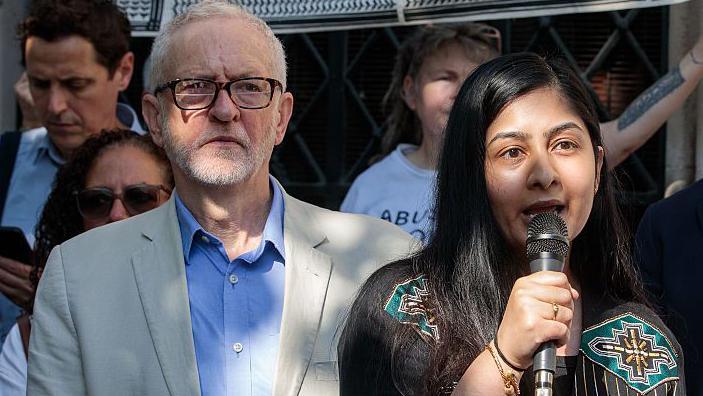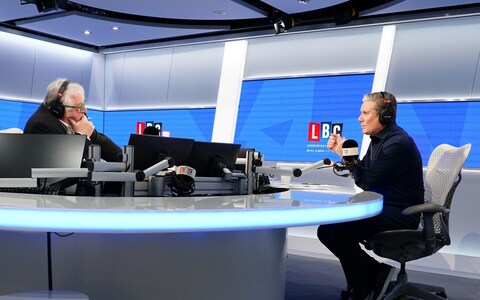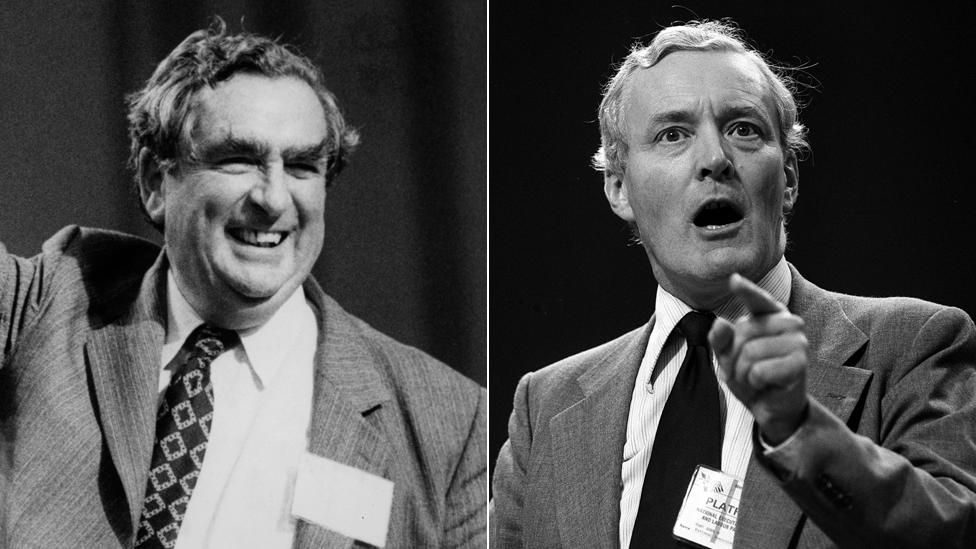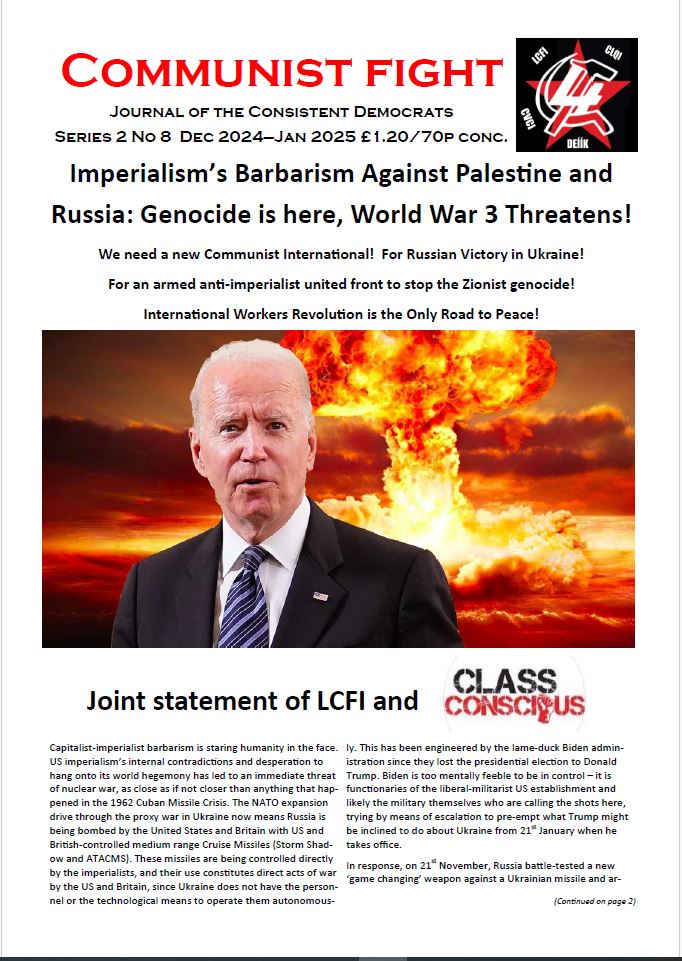
We are living through the biggest split in the Labour Party’s history, though it is happening in a long-drawn-out and novel manner. This is the continuation of a struggle that has been going on for many years, a continuation of the conflicts in the Labour Party and the labour movement more broadly since Corbyn’s election as leader in 2015, the tumultuous years of Corbynism, the witchhunts, the near victory in the general election in 2017, the sabotaged election campaign of 2019, and then the forcing out of Corbyn. And turn, these have continuity with the conflict over the Cold War in the 1980s, the miners’ strike of 1984-5, and the defeats of the unions under Thatcher and since with support from traitorous neoliberal Labour leaders like Kinnock, Blair, Brown and now Starmer. The artificial, engineered defeat of Corbyn meant that the mass base that it had generated never dissipated – rather it went into abeyance in a state of seething resentment at the Zionist-led wrecking operation.
When the Zionists and Blairites could not get their way by the ‘anti-semitism’ smear alone, they changed tactics and cynically exploited the Brexit issue to mobilise the most backward and demoralised, semi-lumpenised, nationalist elements of the working class against the left. Starmer’s strident demand for a second Brexit referendum exploited justifiable hostility to Farage’s anti-immigrant, imperial-nostalgic ‘Make Britain Great Again’ movement but the second referendum demand was a tactical error for those who sincerely backed it – it gave Farage and Johnson the weapon of a hypocritical concern for ‘democracy’ to use against Labour. For Starmer, it was just a means to an end – the defeat of Corbyn’s Labour. In 2017 Corbyn did not make this error – he accepted the Brexit referendum outcome but actively sought a soft Brexit. Once Starmer had helped Johnson to defeat Corbyn in 2019, he became one of the worst Brexiters and flag-shaggers – everything he does is wrapped with the Union Flag to this day. Today his regime tries to compete with Farage as to who is most brutal to migrants.
The defeat of Corbyn in 2019 led to the election of Starmer as leader of Labour in 2020. That too was engineered. A situation was created where everyone knew that any halfway credible leadership candidate who did not in some way swear loyalty to Zionism would be smeared as ‘anti-Semitic’ and suspended from the party to rig the election. It would have required a massive offensive of a confident and clarified anti-Zionist left to overcome that. Cravenly, all the leadership candidates who succeeded in getting nominated, either declared themselves to be Zionists themselves, or in the case of Starmer, declared that he supported Zionism “without qualification”.
With the election of Starmer, the split began. Many who had eagerly supported Corbyn, despite all his flaws and capitulations, refused to support Starmer, because they knew full well that he was a placeman whose election had been orchestrated by the same people who had conspired to defeat Corbyn. A sizeable layer knew full well that Starmer’s claim to stand for many of the same things that Corbyn stood for was simply cynical eyewash to get votes from the unwary and the naïve. Then came the huge purges of just about anyone who stood for anything connected with Corbyn in any serious sense. So, Labour’s membership is 309,000 currently, as compared to 532,000 in 2019 under Corbyn, a loss of around 220,000 or so. This loss of hundreds of thousands of members was the tip of an iceberg in terms of support more generally and what could have been potential members. It was clearly a powder keg waiting to go off. This huge layer had already been seriously radicalised against Zionism as a key agent of capitalist reaction by the experience of the witchhunt in the Labour Party, and then were part of the much broader radicalisation of British society by the genocide in Gaza, which exposed what the Corbyn witchhunt was obviously about – clearing the way for Labour to support a genocide.


Which Starmer clearly did right from the moment the genocide began. Interviewed by Nick Ferrari on LBC on 8th October 2023, he clearly defended Yoav Gallant’s order for Gazans to be starved of fuel, food and water. Starmer’s regime has persecuted Palestine solidarity activists in ways that the previous Tory government never dared, getting the cops to effectively ban Palestine marches and having leading Palestine and anti-war activists like Chris Nineham and Ben Jamal arrested and prosecuted on trumped-up charges of breaking ‘public order’. They have instituted outrageous raids on the homes of Palestine activists and journalists like Asa Winstanley and Sarah Wilkinson, effectively using the state to wage a campaign in wider society that is an extension of the witchhunt Zionists waged in the Labour Party against the pro-Palestinian left. The IHRA pseudo-definition of anti-Semitism was always about trying to coerce the Labour Party membership to not oppose genocide, as its key tenet was that equating Israeli policy with that of the Nazis – i.e., genocide, was “anti-Semitic”. The clear logic of this was always that it would therefore be “anti-Semitic” to accuse the Israeli state of behaving like Nazis even when they began outright genocide, meaning that the IHRA pseudo-definition should itself be regarded as a Nazi-like document, playing a role in some ways similar to that of the Protocols of the Elders of Zion in the proto-Nazi movement – as an ideological cover and warrant for genocide.
This was tried out on the membership of the Labour Party in the Corbyn witchhunt period, and now it is being used in wider British society, as with the bans on Palestine marches, supposedly for disturbing synagogues simply by being nearby, and now, desperately in the proscription of Palestine Action for supposed “terrorism”, in cahoots with the Israeli government and the far right Israeli Ambassador, Tzipi Hotlevy. But this has triggered off huge popular discontent, as the Labour government has been seen to ban and arrest critics of the most documented and publicised genocide in history, while visibly hob-nobbing with the perpetrators. All these conditions led to explosive mass growth of the Corbyn-Sultana party project, once it was kicked off by Zarah Sultana when she announced her resignation from Labour in early July. In less than a month, after she announced that she and Jeremy Corbyn intended to found a new political party to challenge Starmer’s Labour, it attracted explosive mass support, first through the Team Zarah website, and later through http://yourparty.uk, it signed up around 700, 000 people by the end of July. Which even allowing for the logistical problems of creating an organisation out of that, is a phenomenal response.
It would be formalistic in the extreme to characterise this as a new party arising from social contradictions to challenge the Labour Party from the left, as if this could be abstracted from the previous struggles within Labour not only over the last decade, but in previous decades also. In terms of mechanics, this is a slow-motion split of the mass Corbynite base that more than doubled Labour’s mass membership and support after Corbyn was elected leader in 2015. That layer haemorrhaged away when Corbyn was brought down by the neoliberals and Zionists. But it never disbanded, never disappeared, it just went into a state of external flux and sporadic mobilisation. Corbyn’s own exclusion from Labour by the deprivation of the whip, and the obvious intention of Starmer to steal Corbyn’s long-held Islington North constituency meant that the previous leader, the one with the genuine mass working-class base, was being hounded out of the party. He defeated Labour in the General Election and retained his seat, as did four Muslim left independents opposing Labour over Gaza. So there is already a group attacking Starmer from the left in parliament before the foundation of the new party.
Corbyn has been extremely slow in drawing the conclusions from this and has created various ‘halfway house’ formations to keep the base together without drawing the full conclusions of it, from Peace and Justice, to ‘Collective’, the latter being somewhat secretive. But the bold actions of the much younger, charismatic Labour leftist MP Zarah Sultana forced his hand, and detonated the outright split.
Decades of Preparation for Split
Which is a profoundly progressive development of a world-historic nature, the biggest split in the history of the mass bourgeois workers party in the oldest imperialist country. With regard to the class nature of the Labour Party itself, this split is the product of the basic contradiction within the party itself, between its nature as the creation of a mass labour movement seeking its own political expression, and the pro-capitalist nature of the politics involved, flowing from the bureaucratic caste within the trade unions which reproduced itself in the political bureaucracy that grew up to lead and administer the party itself, with reformist politics that are ultimately bourgeois. In 1982, the Spartacist League, which was then possibly the closest thing to genuine Trotskyism around at that time, wrote about the Benn-Healey contest for the Deputy Leadership of Labour:
“The deep schism in today’s Labour Party is not simply another, typical, case of the party in opposition striving to refurbish its ‘socialist’ credentials among working people alienated by years of betrayal from the Westminster benches. Thus it will not lightly be healed; thus the palpable sense on all sides that the Labour Party cannot go on in the same old way. There is normally a symbiotic relationship between left and right in the party. Together they make a fine team for attacking the working class: while one lulls the workers with airy talk of socialism the other does (or both do) the bosses’ dirty work. This was certainly true in the last Labour government, when Benn played a major role in giving a left cover to anti-working-class betrayal. Today, however, this symbiosis has lapsed.
A distorted and uneven class line is being cleaved in the Labour Party under the impact of renewed anti-Soviet Cold War; between Little England reformists and NATO/CIA-loving ‘internationalists’, lacking in sharp programmatic counterposition but necessarily reflected in and inseparable from domestic class questions…
Reduced in status from its hegemonic position to simply the most powerful of’ several imperialist powers (marked and in part exacerbated by its humiliating defeat in Vietnam), American imperialism prepared itself, with Carter’s anti-Soviet ‘human rights’ campaign, for a course of open military confrontation with the Soviet Union — aiming at a favourable redivision of world markets over the corpse of the Soviet workers state. The international economic crisis which fuels this anti-Soviet war drive intersects in Britain a deep, long-term structural decline. To retain their standing as any sort of imperialist power, the dominant sections of the British bourgeoisie see no course other than an emasculation of the trade unions at home coupled with slavish allegiance to the Atlantic alliance. In this context the contradictions of the Labour Party as a bourgeois workers party have been brought sharply to the fore. In its role as a defender of British capitalist interests, the central core of the postwar Labour bureaucracy has been a staunch advocate of the ‘American connection’, while policing the unions when in office with a combination of reformist carrot and repressive stick.
The politics of the Bennite left –primarily a repudiation of the dismal record of the last Labour government and a utopian unilateralist attempt to pull Britain out of the Cold War vortex –are a reformist dead end from the point of view of the immediate and historic interests of the working class. But they threaten to make Labour an aberrant party in today’s conditions, a party unfit, in the eyes of the bourgeoisie, for ‘responsible’ government. Unable to control the rise of Bennism, much of the historical right wing leadership of the party.is actively rethinking its need for the trade union movement as a political base of operations, and has undertaken or is considering an open break with the labour movement. A correct understanding of’ and tactical stance towards the political realignments in and around the Labour Party … is crucial for Marxists striving to break the stranglehold of Labourite reformism over the working class and forge a revolutionary vanguard to lead the proletariat to power. (Spartacist Britain #41, April 1982, https://www.marxists.org/history/etol/newspape/spartacist-uk/041_1982_04_Bristish-spart.pdf)

Notwithstanding the glib formulation at the end about “forging a revolutionary vanguard” (which is easier said than done and can only really be a product of serious programmatic development involving a sizeable movement of class-conscious workers), nevertheless this analysis is broadly correct and relevant to this day. That ‘distorted and uneven class line’ has been a common thread of the anti-working-class development of Labour’s political bureaucracy since the early days of Cold War 2 in the 1980s, i.e. the Reagan/Thatcher ‘revolutions.’ It is a key part of the political context for major developments since, along with the rise of Zionism to the position of the hegemonic form of racism in bourgeois politics largely flowing from the role of Jewish-Zionist ideologues as the chief ideologues and popularisers of neoliberalism
Under Kinnock, then Blair and Brown, Labour had become outright reactionary-neoliberal and openly anti-working class, as epitomised by its junking in 1995 of the formal aspiration of the aim of a society built on “common ownership” – the old Clause 4, part 4 of the Fabian reformists Sidney and Beatrice Webb, who co-founded Labour as a mass membership party in 1918 on this basis (though the early foundational work as a federal trade-union-led party was led by Keir Hardie). The aspiration of “common ownership” was replaced by a new, basically Thatcherite Clause 4, which includes in part 2, a commitment to “the enterprise of the market and the rigour of competition” (http://www.labourcounts.com/Clause_four_comparisons.htm) This excrescence has dominated Labour since the strategic defeat of the trade unions under the rule of arch-Tory Margaret Thatcher in the 1980s, above all with the defeat of the year-long miners’ strike in 1984-5, a defensive struggle that, because of the betrayals of the rest of the labour movement and the sheer brutality of the state, at times took almost insurrectionary forms. This outcome conditioned the rise of Blairism in the 1990s,
Under Blair and later Brown’s New Labour, which ruled Britain from 1997 to 2010, a widening chasm emerged between what was in effect a neoliberal political “class” dominating Labour, and much of the working-class movement. A major part of New Labour’s project was imperialist militarism, much of it linked to support for Zionism, as with the Iraq war carried out with Bush’s US administration. Domestically, Blair’s regime, though it did liberalise some elements of labour laws, also kept the overwhelming majority of the anti-union laws that the Tories had nailed in place since the miners’ defeat, and not only did not reverse any of the Thatcher/Major government’s privatisations, it engaged in privatisations of its own, from air-traffic control, partial privatisation of council housing administration, and partial privatisation of the London Underground. It continued the Tories ban on new council housing, while at the same time, as did the Tories, letting monetary policy rip in such a way as to create massive house-price bubbles that really rigged the housing market to enrich the wealthy and landlords, following in Thatcher’s footsteps. So much so, that new Labour was deemed by Thatcher in a later speech, as “my Greatest Achievement.”
The capitalist financial crisis of 2007-9, the near collapse of the banking system under neoliberal deregulation, was so severe that it brought down incumbent neoliberal governments in the US and Europe, including New Labour in 2010. In the US it brought to power the seemingly liberal black Democrat Barack Obama on a wave of social-democratic rhetoric, which proved in office to be largely cynical. In Britain, a hung parliament brought to power a coalition of Tories and Liberals that blamed excessive indulgence of the working class, poor and disabled for the financial crisis, and severely cut social benefits. After the defeat of new Labour in 2010, the overt Blairites suffered a partial defeat when the soft-left Ed Miliband won the leadership, talking of a ‘crisis of working-class representation’, and traded on his claim to have opposed the Iraq war (which was not completely clear, as at that time nobody had heard of him!) He was ineffectual in the face of austerity, and his leadership coincided with a major strengthening of an anti-immigrant, reactionary movement, that sought a British exit from the European Union to get rid of East European immigrants, whose cheaper labour had played a large role in the boom under New Labour prior to the financial crisis, and then were made scapegoats. Miliband’s ineffectual leadership, and the collapse of the Lib Dems’ popular support because of their role in austerity attacks gave the Tories an unexpected majority at the 2015 General election, and allowed the anti-EU, anti-migrant right-wing UKIP to put enough pressure on the Tories to call a referendum on Britain’s membership of the EU.
Massive political insurgency – 2015: repeated in 2025
It was unprecedented for a leader of the outright ‘socialist’ left social-democratic left-wing of the party, sometimes known as the ‘hard left’, to be elected leader of the Labour Party, as Jeremy Corbyn was in 2015. This was actually a massive insurgency of the socialist-minded working-class base of Labour against the neo-liberal political bureaucracy, whose hatred of organised labour already had few boundaries. This was driven back in a brutal manner by the Zionists and neoliberals, as detailed above. But the Sultana/Corbyn Party has simply given an embryonic organisational expression to this political split, which is along the distorted and uneven class line referred to above. This has the potential to resolve the class contradiction of Labour as a bourgeois workers party, in favour of creating a genuine mass party of the proletariat in Britain. Which to realise its potential, must be communist and internationalist in its politics.
This split is along a distorted, perhaps deformed, and uneven class line – the split is not pure. This is because the leftist, pacifist politics of Jeremy Corbyn, the most left-wing leader of the Labour Party since George Lansbury in the 1930s, are not free of bourgeois prejudices themselves. They dream of the peaceful overcoming of capitalist contradictions, or barbarities, through electoral means, but with the re-creation of a ‘proper’ welfare system and rolling back privatisation – supportable demands of course, but not revolutionary. However, the ruling class will not entertain this for a moment. This itself is dangerous to the new party and its potential to lead. The ruling class has shown by its brutal support for genocide in Gaza, and its unsubtle support for outright Nazis in Ukraine, the depths of barbarism to which it will sink when its prerogatives are challenged by the oppressed.
Yet this is also a new start, and many tens or even hundreds of thousands of subjective socialists will join the new party eager to fight for political answers to these things. In this situation, all socialists and communists should join the new party and be prepared to fight for socialism in a non-reformist, class struggle sense. This includes the militants of large social-democratic sects with ‘revolutionary’ pretentions like the Socialist Party, the Revolutionary Communist Party and the Socialist Workers Party, many of whom have, mixed with their revolutionary aspirations, elements of capitulation to imperialism such as Russophobia and Sinophobia, some softness on Zionism, etc. On the other hand, such movements as George Galloway’s Workers Party of Britain, with better politics on such questions, but that have also adapted to backward sections of the working class over questions like immigration and the defence of oppressed groups like transsexuals and even gays, should likewise be drawn into the movement so these problems can also be more effectively overcome. We hear that the Workers Party wants to affiliate to the new party – we would support that.

We could see serious elements, or even sizeable currents, within the new party develop beyond reformism in an incomplete way, embracing incoherent forms of what Marxists have traditionally called ‘centrist’ politics. This has nothing to do with the fashionable usage today to describe Blairite type disguised right-wing politics. Rather it refers to forms of politics that vacillate between reformism and revolution. Currently mainly the preserve of small sects, there is a precedent in British labour history for such a development on a larger scale with the Independent Labour Party, which split from Labour in 1931, opposed social democracy from the left, but never developed a coherent alternative. The healthy development of a genuine working-class party could certainly encourage leftward development but hopefully avoid such flaws emerging.
Communists and Workers Parties
A genuine workers party, which the British left has no real experience of, would tend to dissolve sectarian cliques and draw everyone into programmatic development. This situation puts us back at the situation of flux and possibility that existed when the Labour Party was founded. We should look to what Marx and Engels wrote to introduce part two of the 1847 Manifesto of the Communist Party for inspiration in dealing with this development:
“II. Proletarians and Communists
In what relation do the Communists stand to the proletarians as a whole?
The Communists do not form a separate party opposed to the other working-class parties.
They have no interests separate and apart from those of the proletariat as a whole. They do not set up any sectarian principles of their own, by which to shape and mould the proletarian movement.
The Communists are distinguished from the other working-class parties by this only: 1. In the national struggles of the proletarians of the different countries, they point out and bring to the front the common interests of the entire proletariat, independently of all nationality. 2. In the various stages of development which the struggle of the working class against the bourgeoisie has to pass through, they always and everywhere represent the interests of the movement as a whole.
The Communists, therefore, are on the one hand, practically, the most advanced and resolute section of the working-class parties of every country, that section which pushes forward all others; on the other hand, theoretically, they have over the great mass of the proletariat the advantage of clearly understanding the line of march, the conditions, and the ultimate general results of the proletarian movement. The immediate aim of the Communists is the same as that of all other proletarian parties: formation of the proletariat into a class, overthrow of the bourgeois supremacy, conquest of political power by the proletariat. “ (www.marxists.org/admin/books/manifesto/Manifesto.pdf)
In this regard, we in the Consistent Democrats have been working with other like-minded socialists in the Socialist Labour Network since that body emerged from Labour, the product of the merger of two important groups of the Corbynite left – Labour Against the Witchhunt and the Labour in Exile Network, both of which were important enough to be proscribed by Starmer, as was the SLN immediately the merger took place. We are now working along with other groupings of independent socialists, such as the Network of Independent Socialists (NOIS) in seeking to join and engage in the formation of the new party, at the same time advocating that it functions according to party and working-class democracy. Though such groupings may have a limited life given the horizons of such a new party, their role at this point could be quite important.
To conclude, we reproduce a motion that was proposed by the Consistent Democrats, and passed, at a meeting of the Socialist Labour Network on 8th August. It captures quite well the opportunities, and dangers, posed by the new party, and some of what socialists should be fighting for in working for it:
“The Socialist Labour Network welcomes Zahra Sultana MP’s resignation from the Labour Party and initiative to co-found a new left-wing party along with Jeremy Corbyn, to challenge Starmer’s brutal, anti-democratic, pro-genocide, warmongering, anti-working-class austerity regime. The New Party has already signed up 750,000 members- compared with the current Labour Party diminishing membership of around 300,000
“Since Thatcher’s strategic defeat of the miners in the mid-1980s, most Labour leaderships have been openly Thatcherite and neo-liberal, the exception being Jeremy Corbyn’s leadership from 2015-2020, which did promise to begin rolling back the decades of austerity. Labour under Corbyn, which the bourgeois media slated as being ‘unelectable’, gained over 12 million votes in 2017 – more than any Labour campaign this century. Even in 2019 when it was defeated, Labour achieved more votes than in Starmer’s election victory in 2024. It was the internal collapse of the Tory party that gifted Starmer that election.
“The real problem with Corbyn was that his left social democracy and ‘broad church’ Labour politics meant appeasing the neoliberal Right to keep them on board. In the face of ferocious attacks from Zionists and their supporters in the media, Corbyn ran up the white flag and actively expelled many good socialists on trumped-up ‘anti-Semitism’ charges. The adoption of the fake IHRA-definition of ‘anti-Semitism’ primed Labour under Starmer to support the current Zionist genocide.
“Starmer, other Labour Zionists and treacherous neoliberals were put in pole position by the weakness of Corbyn and the left, to sabotage Labour and destroy Corbyn’s leadership. This was done with the avid cooperation of the BBC and the entire Zionist-supporting, neoliberal legacy media. The Starmer regime that came out of this is genocidal and anti-democratic. Its outrageous proscription of Palestine Action demonstrates that corporate Labour is now rolling out to the whole population its treatment of its own members.
“Labour’s brutal attacks on the working class, migrants, pensioners, the disabled and sick, benefit claimants etc, flow really from the ruling class’s current aims. Starmer was put in place to deliver on the ongoing aims of the neoliberal regime- the concentration of power and resources in the hands of the few. Its current trajectory will place power in the hands of the openly far-right in the guise of the Reform Party.
“The Zahra Sultana-Jeremy Corbyn party has great potential to squash the ruling class’s far right project. But we must learn the lessons of the previous Corbyn leadership. Left social democratic politics are fundamentally inadequate today, more than ever. We need a genuinely working-class party with a democratic internal structure and culture where strategic, programmatic questions can be fully debated and resolved. We need to move beyond reformism to allow for the development of revolutionary alternatives. We cannot allow the workers movement to be defeated by Zionists, fascists or the subversion of even bourgeois democracy by the bourgeois state, its armed forces and intelligence services. We need a party that has a consistently anti-imperialist policy, which opposes Western imperialism and all its proxy forces around the globe.
“There can be no ‘friends of Israel’ in such a party – Zionism is a ferocious class enemy of the workers. We must be on our guard against other forms of right-wing infiltration. But we must be aware that if the ruling class is denied the chance to wreck the new party by subversion internally, they will seek other means – including military rebellion, fascism and potential coups. It is not accidental that during Jeremy’s leadership senior military officers openly threatened rebellion were he to be elected, and soldiers used his image as target practice on shooting ranges. The new party needs to take this on board – the working class cannot be merely pacifist in the face of ruling class violence. The labour movement needs its own means of resistance. We need a party that points the way to working class rule, and a break with notions of class collaboration and co-existence with a capitalism that threatens humanity with world war and environmental collapse.
“The SLN stands with the new party, provisionally known as ‘Your Party’. It exhorts the party to be bold in its vision for progressive and revolutionary change, and develop beyond social democracy and its tradition of betrayal.“
(https://socialist-labour-network.org.uk/motions-from-amm-on-8th-august-your-party-and-palestine-action/)

